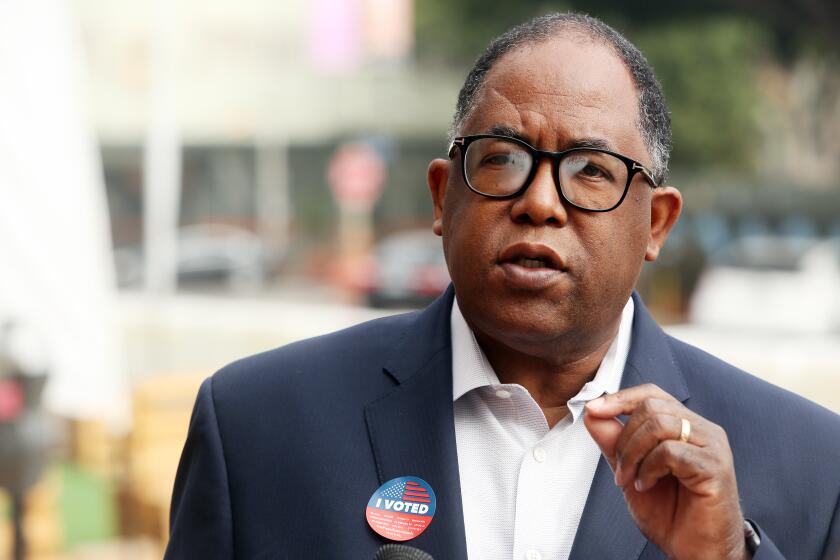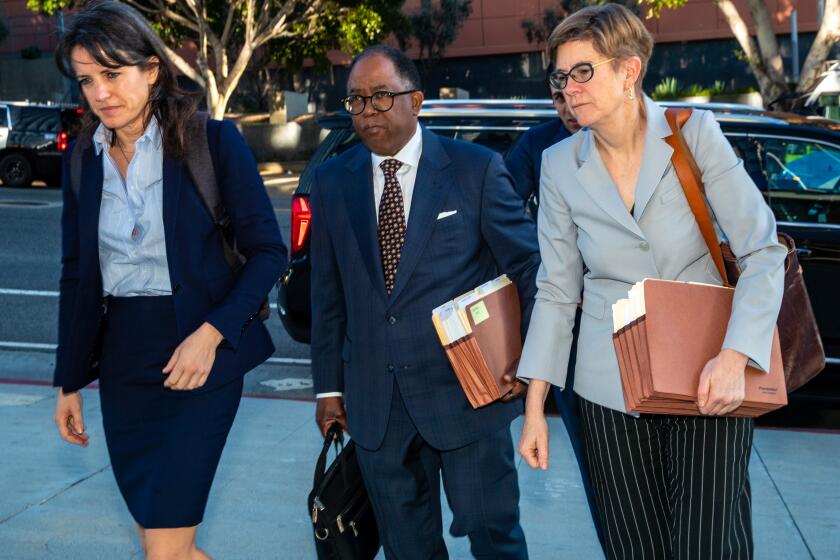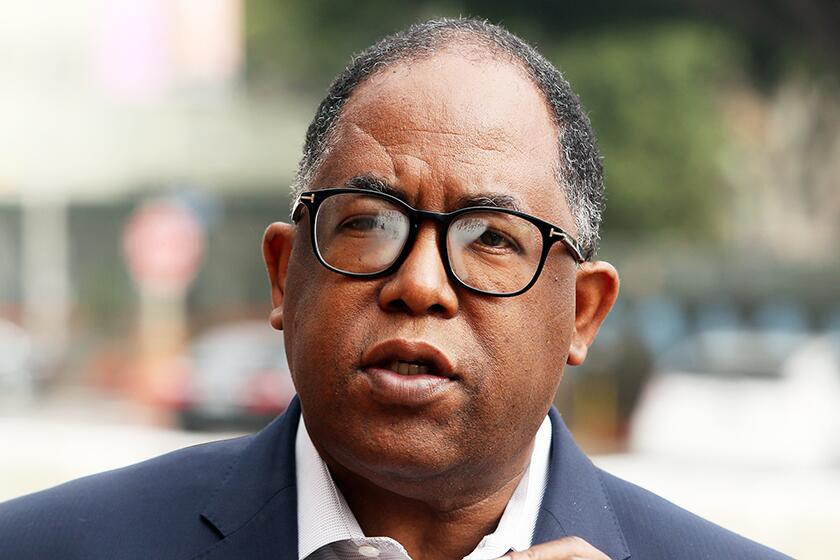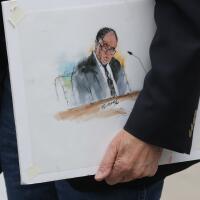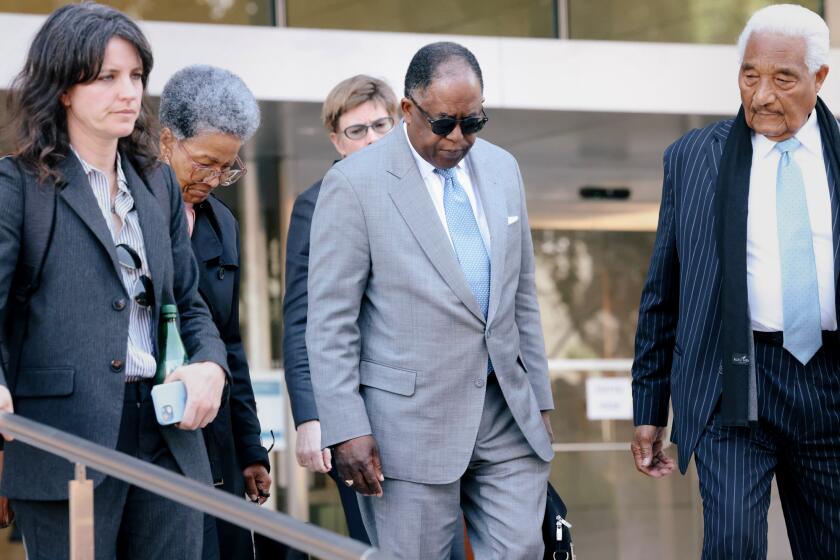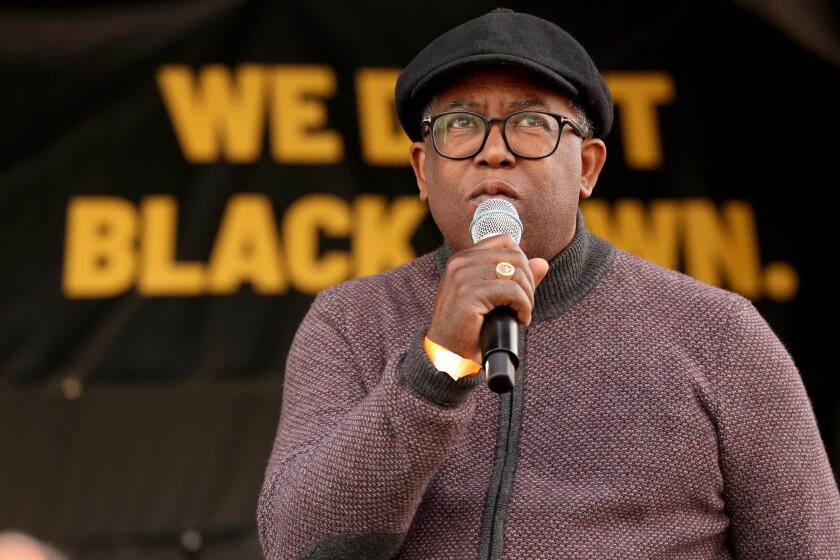Mark Ridley-Thomas found guilty in corruption case
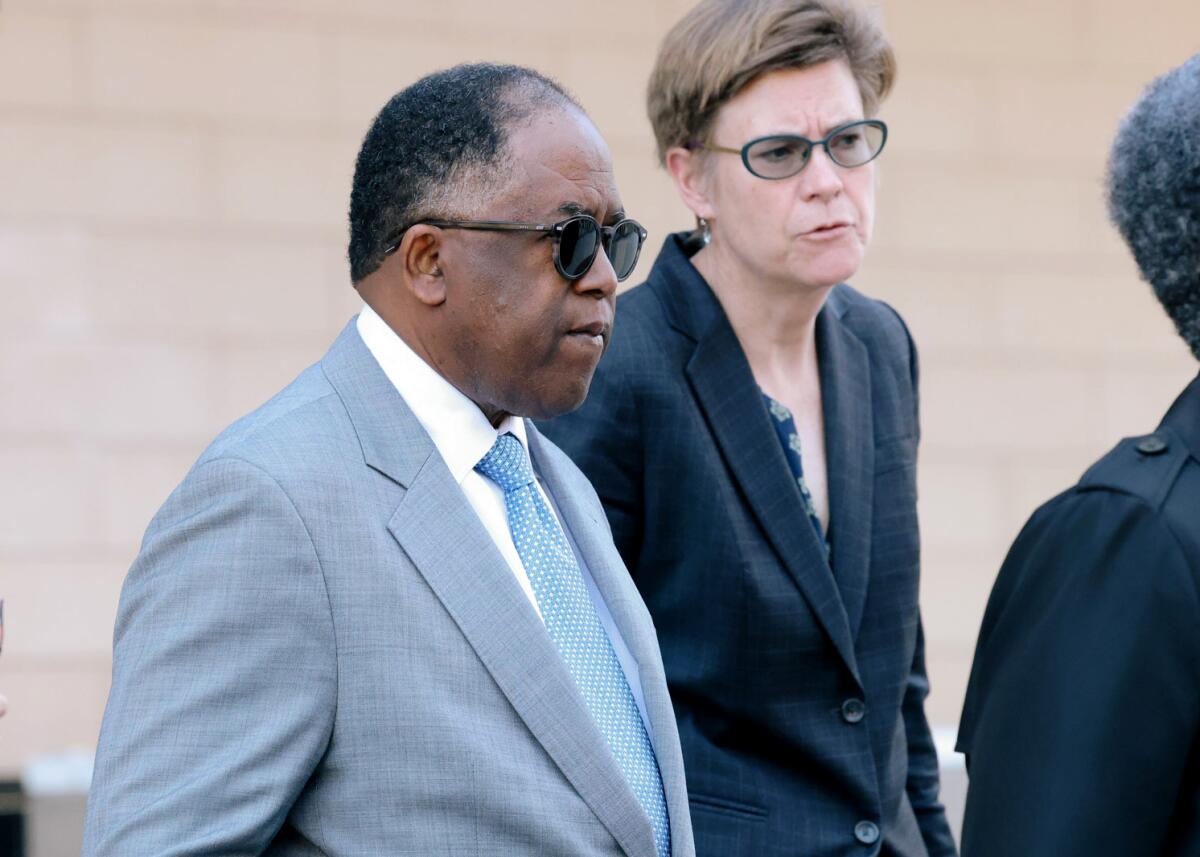
Mark Ridley-Thomas, one of Los Angeles County’s most prominent politicians, was found guilty Thursday of federal corruption charges for extracting special benefits for his son from USC while voting in support of motions and a contract sought by the university.
The verdict, which jurors reached in their fifth day of deliberations, marks a devastating fall for a man who for more than 30 years was a power broker in L.A. politics and a staunch advocate for civil rights and racial justice.
Ridley-Thomas, 68, now faces the possibility of years in federal prison and the permanent loss of his seat on the L.A. City Council, from which he has been suspended for the last 17 months.
Of the 19 counts against Ridley-Thomas, jurors found him guilty of seven: conspiracy, bribery, honest services mail fraud and four counts of honest services wire fraud.
As U.S. District Judge Dale S. Fischer read the jury’s decision aloud Thursday morning, Ridley-Thomas sat quietly beside his defense attorneys.
A former USC dean is charged with paying off Mark Ridley-Thomas in exchange for millions of dollars in L.A. County contracts with the university.
The split, according to the jury foreperson, stemmed from differing views among the panel about what conduct in the case was unlawful.
“There was dishonesty. There was a lack of transparency,” said Kirsi Kilpelainen, 35, a San Luis Obispo resident who served as foreperson for the jury. But she said there was disagreement over whether the various benefits Ridley-Thomas’ son received — a scholarship, job and admission to USC — amounted to a crime.
Ultimately, the foreperson said, the funneling of a $100,000 donation from Ridley-Thomas’ campaign committee through USC to a nonprofit led by the politician’s son persuaded jurors to convict.
“It ended up being the $100,000 donation,” Kilpelainen said, explaining that it was clear Ridley-Thomas directed the movement of funds, and that the funneling of money came in advance of a summer 2018 vote by Ridley-Thomas to extend a contract with USC.
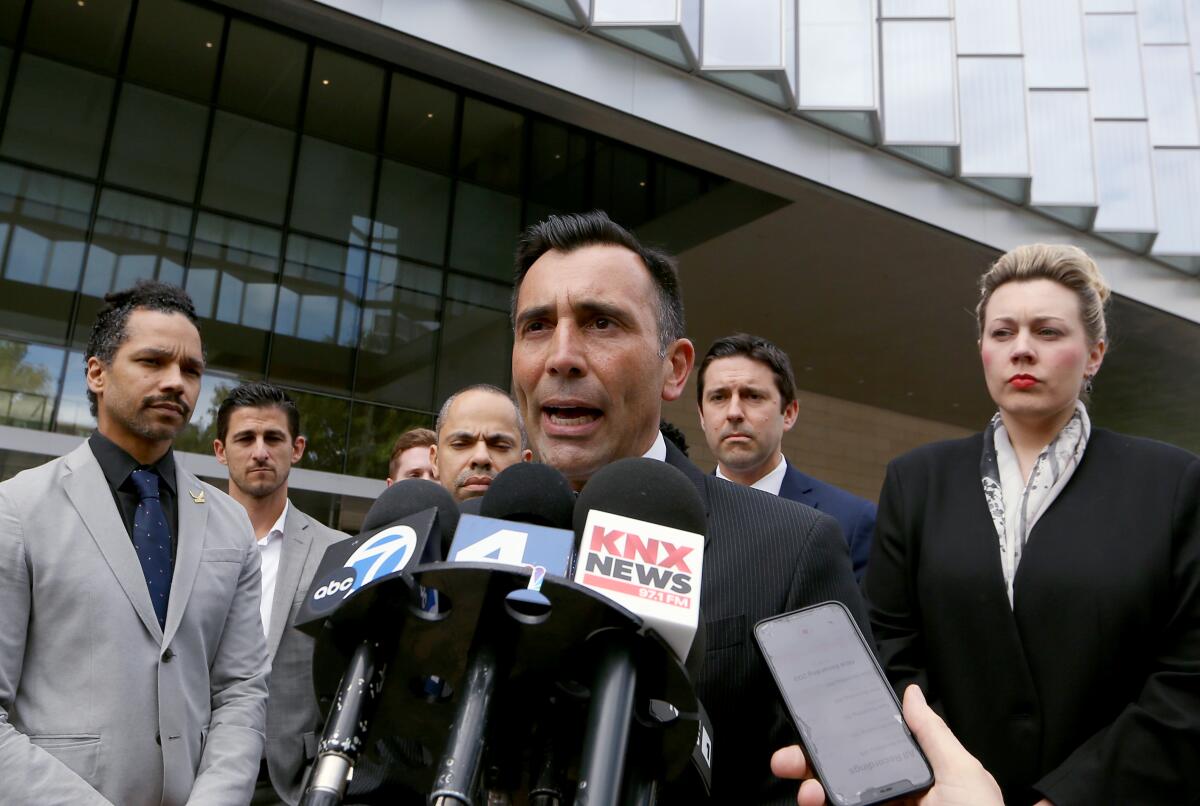
The verdict is the most high-profile in a string of victories for public corruption prosecutors in the U.S. attorney’s office in L.A. That squad secured guilty pleas from two other L.A. City Council members and won the conviction of U.S. Rep. Jeff Fortenberry in an illegal campaign contribution case. The team has also unraveled a corruption scheme involving L.A.’s Department of Water and Power and sent a wealthy Beverly Hills developer to prison for bribery in a case involving leases with L.A. County government.
Thursday’s verdict also validates the work of FBI Special Agent Brian Adkins, a well-regarded public corruption specialist whose investigative steps were repeatedly attacked by Ridley-Thomas’ defense attorneys as they sought to sow doubt in jurors’ minds about the case presented to them.
“The people that elected Mark Ridley-Thomas were entitled to honest services. They were entitled to have him not act in a corrupt way,” said Martin Estrada, the U.S. attorney for the Central District of California, in a brief news conference outside the downtown L.A. federal courthouse. “But instead of doing so, he engaged in political corruption — and that’s why he’s been convicted today.”
L.A. Mayor Karen Bass, a longtime political ally and friend of Ridley-Thomas, called the verdict “a sad day for Los Angeles.”
“And I feel that sadness personally,” said Bass. “For decades, Mark Ridley-Thomas has been a champion for our city, a civil rights activist, a thought leader and a policymaker who made a real impact on the city.”
Ridley-Thomas, who left the courthouse Thursday without speaking to reporters, is scheduled to be sentenced Aug. 14. A representative for his defense team confirmed that he would appeal.
To convict Ridley-Thomas, prosecutors and the FBI pored over reams of emails, phone records and internal USC documents to stitch together a timeline of the lawmaker’s dealings with Marilyn Flynn, the former dean of USC’s social work program.
Prosecutors outlined a conspiracy that began around May 2017, when Ridley-Thomas’ son Sebastian Ridley-Thomas, then a member of the state Assembly, began expressing interest in attending USC’s graduate social work program.
L.A. City Council President Paul Krekorian called on his colleagues to reappoint Heather Hutt as the District 10 council member.
In emails, Flynn expressed eagerness to enroll Sebastian, describing her plan to give him free tuition and saying she did “the same for Karen Bass — full scholarship for our funds.”
Prosecutors found the email about Bass a brazen example of using scholarships as a means to secure government contracts.
“It’s not rocket science what Marilyn Flynn is looking for here,” Assistant U.S. Atty. Lindsey Greer Dotson told jurors in her closing argument last week. Bass was never charged, but as a member of Congress representing L.A. at the time, she had sponsored a bill that, if passed, would have expanded federal funding to social work schools.
To show Ridley-Thomas’ role, prosecutors zeroed in on a June 2017 meeting he had with Flynn. At the time, Ridley-Thomas was a member of the Board of Supervisors, and the pair discussed Flynn’s requests for county business. Flynn later memorialized their meeting in a letter she had hand-delivered to the politician’s office.
To prosecutors, the letter was the blueprint for the conspiracy — proof that Sebastian’s path at USC was discussed in the same breath as Flynn’s wish list for government business.
A plan marked by “winks and nods” between Flynn and Ridley-Thomas turned to “pushes and shoves” in December 2017, prosecutors said. That month, a sexual harassment investigation into Sebastian Ridley-Thomas was launched by lawyers at the state Capitol.
With scandal threatening the Ridley-Thomas political machine, prosecutors argued that he leaned on Flynn to supply Sebastian with extraordinary benefits and a “landing spot” after resigning from the Legislature under the false pretense of health problems.
Among the benefits: admission and a full scholarship before he had even finished his application; a part-time professor‘s position; and later, the routing of $100,000 through USC to the Policy Research and Practice Initiative, a nonprofit run by the younger Ridley-Thomas.
Federal prosecutors finished presenting evidence in their corruption case Friday against suspended Los Angeles City Councilmember Mark Ridley-Thomas, clearing the way for the powerful lawmaker’s defense to share its side of the case next week.
Through the duration of the alleged conspiracy, Mark Ridley-Thomas voted on three agenda items before the Board of Supervisors that directly related to USC’s social work program and were coveted by Flynn. Her reactions to these votes were among the strongest evidence against Ridley-Thomas.
“I met with the supervisor recently,” Flynn told a colleague before one vote, adding, “This is exactly what I had hoped would happen.”
Despite the elaborate sequence of events, the jury foreperson, Kilpelainen, indicated that the panel could not agree unanimously that Ridley-Thomas was involved in all of the benefits his son received.
“Many of the jurors believed that there was no connection between Mark Ridley-Thomas and the USC things, and it came back to the $100,000 donation,” Kilpelainen said.
The funneling of $100,000 from one of Ridley-Thomas’ campaign committees through USC, and then to the United Ways of California, which was sponsoring his son’s nonprofit, was documented in a series of emails by him and Flynn.
Prosecutors contended the circuitous route was to disguise that Ridley-Thomas’ campaign committee was the true source of the funds, and that neither United Ways of California — nor the public at large — would know that the money supporting Sebastian Ridley-Thomas’ nonprofit originated from his father.
The foreperson said one email in particular stood out: a May 2018 message from Ridley-Thomas in which he shared bank wiring instructions with Flynn, the USC dean, and showed him directing the flow of money. He urged the dean to “act with dispatch” so that an employee could be hired at the nonprofit, according to the email.
After the $100,000 had arrived, Flynn emailed Mark Ridley-Thomas, “This one was easy. Sort of.”
Within days, Flynn also told colleagues that she had secured the renewal and amendments to a contract with L.A. County for remote mental health treatment, telling a colleague she had to do a “favor” to get it done.
“She knew: Mission accomplished,” Asst. U.S. Atty. Michael J. Morse told jurors last week.
That the jury based their convictions on the routing of $100,000 through USC suggests defense attorneys were successful at chipping away at much of prosecutors’ framing of the evidence.
The defense had emphasized that Sebastian Ridley-Thomas had resigned from the Assembly for legitimate health reasons, not a looming sexual harassment inquiry.
Defense attorneys also pointed out Sebastian’s qualifications: that he had been thrice elected to the Legislature before the age of 30 and had sponsored dozens of bills in Sacramento — making him a shoo-in for admission, a scholarship and a job at USC.
Next, the defense team attempted to establish that there was no need for or upside to bribing Ridley-Thomas. They emphasized that the lawmaker’s longstanding and public support for the key votes in the case all aligned with the politician’s key policy goals.
The defense wanted jurors to contemplate why anyone, let alone a social work dean, thought they had to offer bribes to accomplish these measures.
Prosecutors and defense attorneys outline dueling portrayals of the veteran Los Angeles politician, who is accused of corruption.
Ridley-Thomas did not testify, and throughout the trial, he quietly watched the proceedings and occasionally gestured to dozens of supporters who packed the courtroom each day. As jury deliberations continued this week, he greeted and hugged friends and former staffers waiting in the halls of the 1st Street U.S. Courthouse.
Flynn, who was ousted as dean of USC’s social work program in 2018, pleaded guilty in September to one count of bribery. She did not testify during Ridley-Thomas’ trial and is awaiting sentencing.
The criminal case grew out of the tumultuous summer of 2018 at USC, when a sexual misconduct scandal involving a former campus gynecologist roiled the university and prompted sweeping changes in leadership.
About this time, a staffer in USC’s social work school raised concerns about the outgoing donation of $100,000. The whistleblower’s report led to an internal investigation and ultimately a criminal referral to the U.S. attorney’s office in L.A. about the suspicious donation, later revealed by The Times.
In this period, developer and former L.A. mayoral candidate Rick Caruso had stepped in as chair of USC’s trustees and led much of the university’s day-to-day operations. He later touted the handling of the whistleblower’s complaint as a sign of reforming the university’s ethics.
On Thursday, Caruso said in a statement, “I was disturbed when I first learned of this and grateful to the jury for carefully weighing the evidence and then doing the right thing.”
Times staff writers Julia Wick and David Zahniser contributed to this report.
More to Read
Sign up for Essential California
The most important California stories and recommendations in your inbox every morning.
You may occasionally receive promotional content from the Los Angeles Times.
